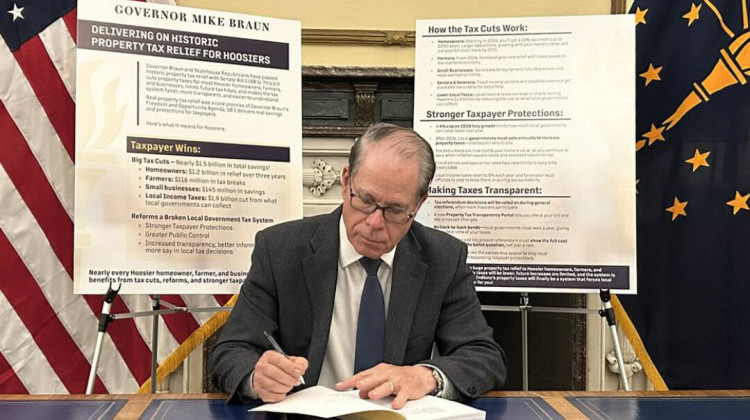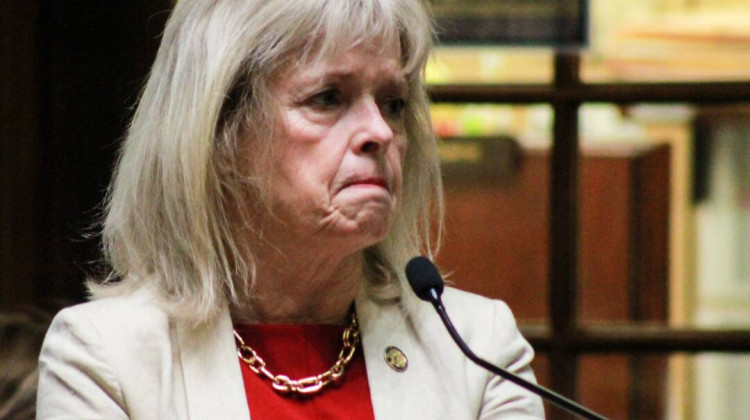
Gov. Eric Holcomb's 2023 agenda includes about $5.5 billion in new and increased spending for the next state budget.
Brandon Smith/IPB NewsGov. Eric Holcomb wants to spend more than $5 billion in new and increased spending in Indiana’s next budget on everything from education to public health and economic development initiatives.
Holcomb unveiled his 2023 agenda Wednesday, the most ambitious of his six years in office.
While it spans a variety of subjects, Holcomb said they all rest “on a foundation of good government.”
“In terms of public safety, in terms of public health, in terms of public education, in terms of community development, in terms of infrastructure connections,” Holcomb said.
The biggest ticket items include $1.1 billion more for K-12 tuition support – that's an 8 percent increase over the last budget. Holcomb wants to spend another $500 million on his READI program, an economic development initiative he launched two years ago. And he wants to boost public health funding by $347 million.
Join the conversation and sign up for the Indiana Two-Way. Text "Indiana" to 73224. Your comments and questions in response to our weekly text help us find the answers you need on statewide issues and throughout the legislative session.
But while Holcomb’s budget proposal represents a major increase in spending over the last state budget, it appears that it doesn’t quite keep up with increases in inflation over the last two years.
So, are state government and schools going to be left still trying to catch up to the pressures of inflation?
“I think Indiana has done one of the better jobs, quite frankly, in the country in addressing not just inflation but a potential recession by our fiscal stewardship, making sure that we’re living within our means,” Holcomb said.
Holcomb’s proposals also include eliminating textbook and curriculum material fees for all public and charter school students and private school students who are on free and reduced lunch.
That's been a priority for Indiana Democrats for a long time. Holcomb noted that Indiana is one of only seven states that allows families to be charged for textbooks.
"To do this will be meeting the spirit of the law, quite frankly," Holcomb said.
The Indiana Constitution requires the state to provide a school system free of tuition and "equally open to all."
Other education proposals in Holcomb's agenda:
- Raising higher education funding by 8 percent, a $184 million increase.
- Expanding eligibility for the state's On My Way Pre-K program to families earning up to 138 percent of the federal poverty limit (about $38,000 a year for a family of four, or about $3,100 a month before taxes).
- Spreading the Dolly Parton Imagination Library to all of Indiana. There are 56 providers in the state right now, entirely bearing the cost of the program, without statewide coverage. Holcomb's proposal would pay for the state's share, hopefully allowing it to expand to cover the entire state.
- Increasing adult education training through the Department of Workforce Development by $12 million.
- Developing a pilot program that would incentivize people on unemployment to complete their high school diplomas or equivalency. Those incentives could total up to $4,000 per person, if they complete the program.
The governor also wants to spend significant money in economic development. In addition to another round of READI grants, Holcomb proposes continuing what his administration calls a "closing fund," dollars to help the Indiana Economic Development Corporation secure deals, to the tune of $300 million. Another $150 million would create a revolving loan fund that helps secure land for site acquisition.
Holcomb remains committed to expanding Indiana's network of trails. His budget includes $50 million for his existing Next Level Trails program. It also allocates $25 million for land conservation efforts.
The two-term Republican is also putting significant weight behind salary increases across state government. His administration implemented a state employee pay boost late last year to help better recruit and retain workers. Maintaining that will cost $160 million.
Holcomb also wants to raise the starting salary of Indiana State Police and other agency law enforcement (like conservation officers and excise police) to $70,000. The current starting salary is $53,690. That carries a $36 million price tag.
The next step: getting lawmakers to go along with all of it.
“We think that they’re not just legitimate, we think that they’re needed, which helps us not be cocky about it but confident that we can be persuasive,” Holcomb said.
READ MORE: How do I follow Indiana’s legislative session? Here’s your guide to demystify the process
Legislative leaders' initial reactions were generally supportive. House Speaker Todd Huston (R-Fishers) said he looked forward to working alongside the governor to help continue the state's momentum.
Senate President Pro Tem Rodric Bray (R-Martinsville) highlighted specific areas of agreement, citing public and mental health funding, law enforcement and K-12 education spending.
House Democratic Leader Phil GiaQuinta (D-Fort Wayne) said his caucus and the governor are on the same page when it comes to eliminating textbook fees and boosting public health.
"But I’m afraid the real question is whether Statehouse Republicans are as forward-thinking as Statehouse Democrats and the governor," GiaQuinta said.
Senate Democratic Leader Greg Taylor (D-Indianapolis) wasn't quite so complimentary. He said while Democrats have pushed many items in Holcomb's agenda for years, the governor's proposals "just fall short" of addressing the state's critical needs.
Contact reporter Brandon at bsmith@ipbs.org or follow him on Twitter at @brandonjsmith5.
9(MDAyMzk1MzA4MDE2MjY3OTY1MjM5ZDJjYQ000))
 DONATE
DONATE






 Support WFYI. We can't do it without you.
Support WFYI. We can't do it without you.